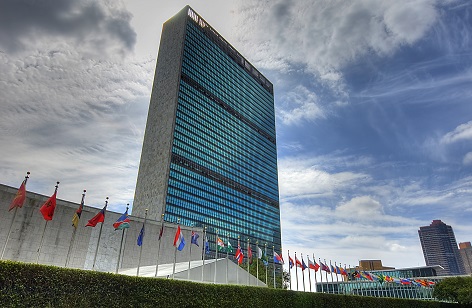UN General Assembly adopts eighth Georgian IDP resolution

The United Nations (UN) General Assembly has adopted its eighth resolution recognising the right of safe, dignified and unhindered return of all internally displaced persons (IDPs) and refugees to their homes in Abkhazia and Tskhinvali (South Ossetia) region.
The UN General Assembly adopted the Georgian-sponsored draft resolution named "Status of internally displaced persons and refugees from Abkhazia, Georgia, and the Tskhinvali region/South Ossetia, Georgia” with a vote of 75 in favour to 16 against, with 78 abstentions, yesterday in the UN headquarters in New York, USA.
Georgian Prime Minister Irakli Garibashvili positively assessed the adoption of the resolution and called it a "victory of Georgian diplomacy”.
"Seventy five states supported the issue of IDPs’ return to their homes in occupied regions. This is an extremely important and unprecedented assistance, as well as expression of support towards our country,” he said.
"In addition, this is a victory of Georgian diplomacy because our foreign agency has worked very well to convince the skeptical states which were not supporting the resolution. Therefore, I would like to point out that we are moving in the right direction."
This was the eighth resolution about Georgian IDPs to be adopted by the UN General Assembly.
For the first time the UN General Assembly adopted a similar resolution on "Protection of and assistance to internally displaced persons” in 2007.
When Georgia first presented this resolution in May 2008, 14 members of the General Assembly voted in favour while 11 voted against. Last year a similar resolution was passed by a vote of 69 in favour to 13 against, with 79 abstentions.
The latest resolution highlighted the need to respect the property rights of all IDPs and refugees affected by the conflicts in Georgia, including in occupied Abkhazia and the Tskhinvali (South Ossetia) region and to refrain from obtaining property that violated those rights.
Georgia’s Foreign Minister Tamar Beruchashvili said each year Georgia presented this resolution to the UN General Assembly to ensure strengthening links of supporter countries and increase this number.
This year the task was accomplished successfully. The number of supporter countries has increased from 69 to 75. For the first time Turkey, which has always abstained from the vote in previous years, voted in favour of the resolution. Also Panama, Guatemala, Saint Kitts and Nevis, Trinidad and Tobago, Guyana and Tonga supported the resolution this year,” she said.
The UN General Assembly’s website stated that by adopting the Georgia IDP resolution, the UN General Assembly would "recognize the right of return of all internally displaced persons to their homes and underlined the need for a timetable to ensure the safe and unhindered return of those affected by the conflicts in Georgia to their homes”.
It would reaffirm the ‘unacceptability of forced demographic changes’ and call on participants of the Geneva Discussions to intensify their efforts. It also would underline the urgent need for unimpeded humanitarian access to all internally displaced persons, refugees and others residing in all conflict–affected areas throughout Georgia,” said the UN General Assembly website.
However the UN General Assembly’s representative of Russia opposed the text and claimed it was "politicized and opportunistic” and requested a recorded vote. He said the Georgian side was using humanitarian principles to pursue its political agenda in defiance of the wishes of the peoples and regions concerned.
Georgia’s Deputy Foreign Minister Davit Dondua stressed the latest resolution was not directed against any sides.
Russia again tried to politicize the issues related to the return of IDPs and their fundamental rights, although the democratic community has recognised that this is a humanitarian problem and needs international support.
Dondua emphasised that each vote in favour of the resolution would send "a powerful signal” to the displaced people of the country, who make up about 10 percent of the population.
"It is very significant that the resolution calls on the participants of the Geneva Talks to become more active in order to improve human rights protection in the breakaway regions. That will promote the IDPs to return to their homes,” he said.
 Tweet
Tweet  Share
Share